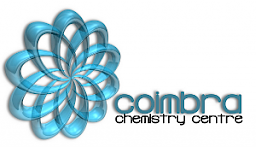Coimbra Chemistry Centre (CQC)
The Coimbra Chemistry Centre (CQC) is the main unit in the University of Coimbra (UC) dedicated to research in Chemistry. It was founded in 1977 and has research interests that include Theoretical and Computational Chemistry, Physical Chemistry and Chemical Physics, Synthetic and Materials Chemistry, Macromolecules and Colloids, and Biological and Medicinal Chemistry. It also has interests in the fields of Cultural Heritage and Forensic Chemistry.
Mission
The CQC provides the research infrastructure of the Chemistry Department of UC and includes 90 PhD integrated researchers, more than 100 PhD, MSc and project students working on an exclusive basis, and associate members both within and outside UC.
Its mission is to promote excellence in research in the Chemical Sciences, by elucidating and controlling molecular mechanisms, developing new fundamental theories, and meeting the evolving technological needs of our society through the design and synthesis of new molecular systems and devices.
This content is loaded from a third-party and is not available because your browser has cookies disabled.
Here's what you can do:
This content is loaded from a third-party and is not available because your browser has cookies disabled.
Here's what you can do:
This content is loaded from a third-party and is not available because your browser has cookies disabled.
Here's what you can do:
This content is loaded from a third-party and is not available because your browser has cookies disabled.
Here's what you can do:
This content is loaded from a third-party and is not available because your browser has cookies disabled.
Here's what you can do:
This content is loaded from a third-party and is not available because your browser has cookies disabled.
Here's what you can do:
Research groups
A - Macromolecules, Colloids and Photochemistry
The Macromolecules, Colloids and Photochemistry Group has as its global objective the detailed study of structure and dynamics of chemical systems on length scales from the molecular level up to macroscopic dimensions, and on timescales from sub picoseconds up to seconds. The group is divided into three main areas that develop their activities in strong cooperation.
B – Medicinal Chemistry
The medicinal chemistry group consists of two laboratories:
C - Molecular Spectroscopy and Thermodynamics
The Research Group of Molecular Spectroscopy and Thermodynamics comprehends two Laboratories whose activity focuses on the use of spectroscopic and thermal analysis techniques for fundamental and applied research on molecular and materials’ structure and chemical reactivity:
D - Theoretical and Computational Chemistry
The Research Group of Theoretical and Computational Chemistry (QTC) develops advanced research activities and human resources training in the fields of theoretical chemistry and computational chemistry. It is a reference laboratory in the field of molecular potential energy surfaces (PESs), where some of the most popular methods for their modeling were pioneered. Another field where it has an established reputation is on topological effects and nonadiabatic chemistry and their implications on spectroscopy and dynamics of chemical reactions, which are relevant in the chemistry of combustion processes and of planetary atmospheres. It has excellent computational resources and codes inhouse built or through international collaboration for representation of global PESs and reaction dynamics calculations, which are continuously being developed.
E - Organic Chemistry
The overall objectives of the Organic Chemistry Group are focused on contributing to the knowledge of synthetic and mechanistic organic chemistry with a strong focus on medicinal chemical applications.
One of the main scientific areas, Synthetic and Mechanistic Heterocyclic Organic Chemistry, is developed by the group coordinator, in collaboration with four PhD researchers (Américo Lemos, Isabel Soares, Ana Cardoso, Susana Lopes). PhDs Elisa Serra and Dina Murtinho have been carrying out studies on Asymmetric Catalysis and Green Chemistry is the main focus of Marta Pineiro’s research. This expertise is used in the search for new bioactive molecules, with particular emphasis on cancer, AIDS and malaria drug candidates.
F - Biological Chemistry
The Biological Chemistry group explores Life from a molecular perspective. The group investigates the structure and dynamics of molecules of Life, their interactions and their role in health and disease. It comprehends 4 sub-groups with expertise in distinct areas.


